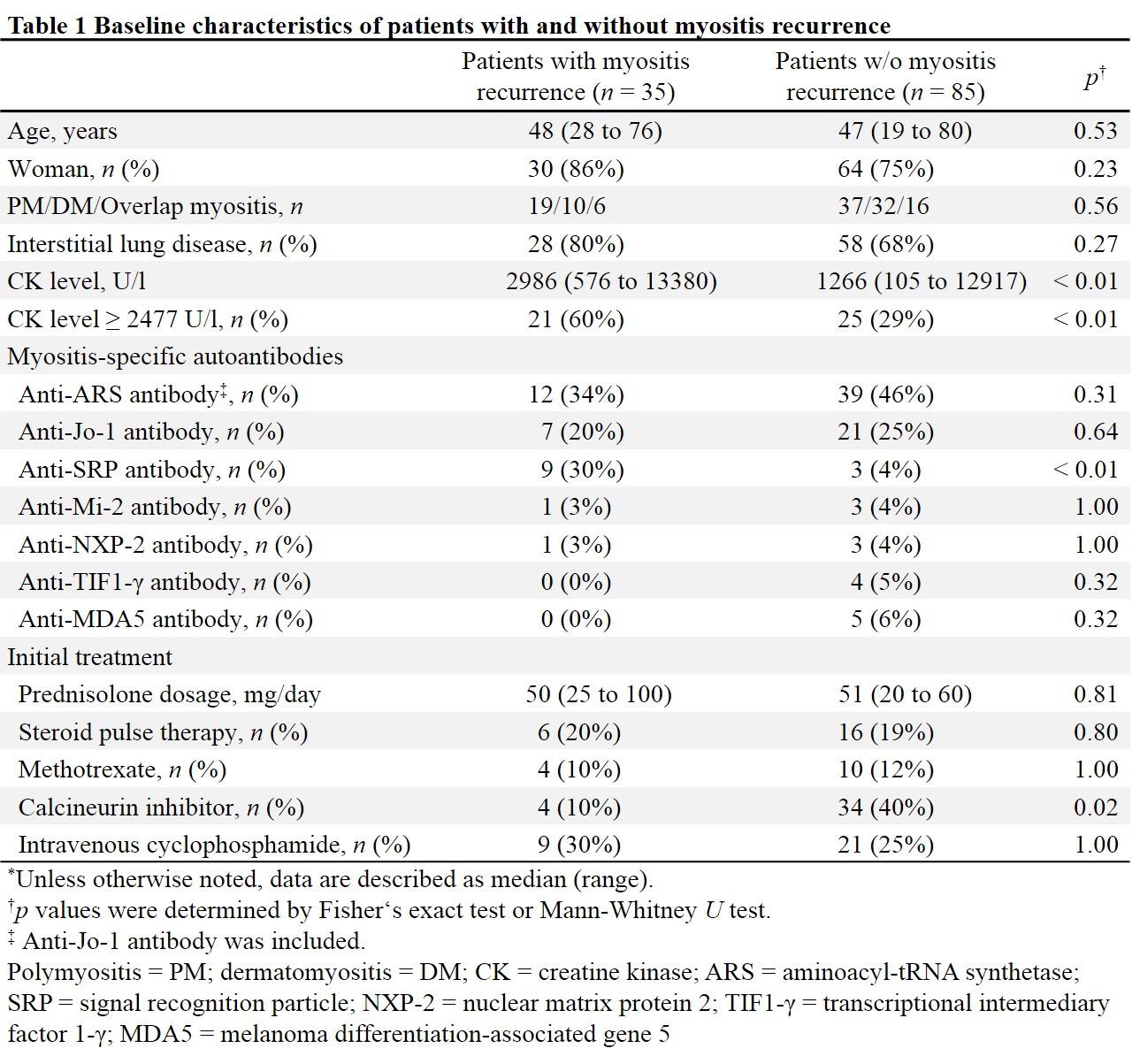Session Information
Session Type: ACR Poster Session C
Session Time: 9:00AM-11:00AM
Background/Purpose: Patients with polymyositis (PM) and dermatomyositis (DM) often experience relapse–remitting courses and recurrent myositis. However, only a few studies focused on this issue, and most of them were reported more than 10 years ago. We aimed to study the characteristics of PM/DM patients with recurrent myositis and to identify its risk factors.
Methods: We retrospectively reviewed the medical records of patients who were diagnosed as PM/DM between 1993 and 2016. All patients satisfied Bohan and Peter classification criteria for PM/DM. Patients with clinically amyopathic DM were excluded. Recurrent myositis was defined as a sustained elevation in serum creatine kinase (CK) levels, which required intensification of immunosuppressive treatment. Myositis-specific autoantibodies were thoroughly evaluated by immunoprecipitation and enzyme-linked immunosorbent assays. The baseline clinical characteristics were compared between patients with and without recurrent myositis. Univariate and multivariate logistic regression analyses were performed to identify the risk factors for recurrent myositis in patients with PM/DM.
Results: Of the 120 patients included in the present study, 56, 42, and 22 patients were PM, DM, and PM/DM associated with another connective tissue disease, respectively. Initially, glucocorticoids were administered to all the patients, and other immunosuppressants were concomitantly used in 76 patients, which led to the normalization of CK level in all the patients. Myositis recurred in 35 patients (29%) during the observational periods (median 2.4 years). Among these, 29 (83%) were treated with glucocorticoids alone at the time of the recurrence: median dosage was 10 mg/day as prednisolone. Table 1 shows the baseline characteristics of the patients with and without recurrent myositis. Baseline CK levels in patients with recurrent myositis were significantly higher than those without (p < 0.01), and the ROC curve analysis determined the cutoff value for baseline CK level as ≥ 2477 U/l. By univariate analyses, baseline CK level ≥ 2477 U/l, positive anti-signal recognition particle (anti-SRP) antibody, and initial treatment without calcineurin inhibitor, namely tacrolimus and cyclosporine were associated with myositis recurrence (p < 0.01). Multivariate analysis identified anti-SRP antibody (odds ratio [OR], 7.7; 95% confidence interval [CI], 1.6 to 38) as a positive risk factor, whereas initial treatment with calcineurin inhibitor (OR, 0.2; 95% CI, 0.1 to 0.7) as a negative risk factor for myositis recurrence.
Conclusion: The present study suggested that anti-SRP antibody is a risk for myositis recurrence and that initial treatment with calcineurin inhibitor is protective against myositis recurrence in patients with PM/DM. In addition, most of the patients with recurrent myositis were treated with glucocorticoids alone at the time of the recurrence.
To cite this abstract in AMA style:
Nishino A, Katsumata Y, Kawasumi H, Kawaguchi Y, Yamanaka H. Clinical Characteristics of the Patients with Recurrent Myositis in Polymyositis and Dermatomyositis: A Retrospective Study [abstract]. Arthritis Rheumatol. 2017; 69 (suppl 10). https://acrabstracts.org/abstract/clinical-characteristics-of-the-patients-with-recurrent-myositis-in-polymyositis-and-dermatomyositis-a-retrospective-study/. Accessed .« Back to 2017 ACR/ARHP Annual Meeting
ACR Meeting Abstracts - https://acrabstracts.org/abstract/clinical-characteristics-of-the-patients-with-recurrent-myositis-in-polymyositis-and-dermatomyositis-a-retrospective-study/
